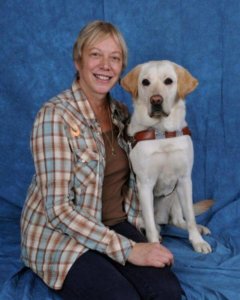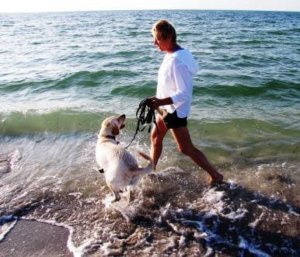Main Menu
 by Guiding Eyes graduate Deni Elliott
by Guiding Eyes graduate Deni Elliott
Once I crossed the bridge from dorm life to adult life, I could not imagine that I’d ever again be a student. But – I also didn’t know that I would ultimately lose most of my sight. I never could have imagined that being a student at Guiding Eyes would change how I interact with people in the world around me.
Guide dog school let me feel normal to be blind. Leaving with a Guiding Eyes dog made the world a safer place for me to be blind. What I didn’t expect was that the acceptance I felt at Guiding Eyes made it okay for me to admit that I’m blind.
My slow progressive vision loss had made it possible for me to adjust to the sighted world expectations that I could still see. I worked harder over time to accommodate the ignorance of those around me. My ability to fake sight was an unneeded skill at Guiding Eyes.
I was worried about getting around at the Guiding Eyes campus. When my home interviewer said that I had good Orientation and Mobility skills, I was thankful that he hadn’t observed my usual technique for mapping strange hotel rooms. Alone in a room, I slid fingers along corners, switched on every light I find, tripped over my suitcase and slammed into doors. Each hotel stay, I earned a new bruise, but was pleased to have found bathroom and closet.
At Guiding Eyes, an instructor met me at the van and described halls and doors as we passed. Once in the dorm room, she verbally handed me the room pieces in clockwise order. Inner door, closet, bathroom. Nightstand. Bed. Window. Here’s how to adjust the blinds. Outer door. Refrigerator. Desk. Dresser. Another closet. Dog food in that one. Then the door to the hall again.
 I listened, still and grateful. I make a mental list to follow. No one had ever done that for me before. I felt uncharacteristically understood.
I listened, still and grateful. I make a mental list to follow. No one had ever done that for me before. I felt uncharacteristically understood.
I met my classmates. Different ages, different voices, different sizes and walks. But, we experienced the world with little or no vision and were giddy with the same goal – meet our new guide dog partners and learn to become teams.
When sighted people used to ask, “What do you see?” I hesitated. I knew that I was being asked how my vision was different from theirs. I didn’t know what to say. But, with my Guiding Eyes classmates, individual descriptions were offered among us. My classmates talked of smears and smudges and slivers of light. I talked about the fuzzy blobs of color that appear in my field of vision and then disappear behind blotches of black and gray. “Hmm. Blobs,” someone says. I can say that to people who can see, I decide.
It wasn’t a big deal at Guiding Eyes, being blind together. One evening, six of us shared a dinner table and conversation with contented dogs dozing at our feet.
“Has anyone found oil and vinegar?” a fellow student asked.
Quiet clatter as we all set utensils down and 12 hands raised up. We extended light fingers beyond the known vistas of our own plates. Without a pause, we searched for the elusive oil and vinegar.
“I found salt and pepper,” said another.
“Hand sanitizer anyone?” offered a third.
“Hey, here it is! Down here.”
Item passed and chat about the day’s lessons resumed. Not one person said that the missing item was “right in front of you,” or could be found “over there.” I was touched by the simplicity. I decided that the sighted people in my life could learn to be helpful too.
Guide dog school was an easy place to be with limited vision. But, Guiding Eyes instructors thrust us, with our new dogs, out in the real world, day after day. Enforced independence under careful supervision. I felt safe but empowered.
Along with the confidence I developed from working with a well-trained guide dog, at Guiding Eyes, I experienced acceptance for how I truly negotiate the world. When I returned home, it was no longer hard to me to say, “I can’t see.” I returned with a new expectation that other people could learn to live with my reality.
The irony is that with my new guide dog’s ability to take me to a curb, to a stair, to a door, to a chair, I am less dependent of people than I ever had been. But, thanks to Guiding Eyes, I’m less hesitant to ask.